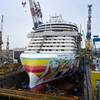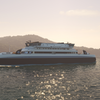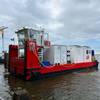Being LNG Ready could be the Best Option for Many Ships
DNV now offers shipowners the support they need to make newbuilds and existing vessels LNG ready with class approved designs, ready for later, simple retrofit of LNG technology. The service enables shipowners to make smart choices and minimal investments now in readiness for when LNG bunkering becomes widely available.
Shipowners are supported through all stages of the decision-making process as they prepare to meet the IMO air emission regulations entering into force from 2015. There are three obvious technology options for meeting Emission Control Area (ECA) requirements: installing a scrubber, switching to low sulphur fuel oil or to go for LNG as fuel and installing gas engines. Alternative fuels such as methanol and biofuels are also being developed.
“Each option has different uncertainties, for example the relative immaturity of some technologies and the effect market forces will have on the price of the different fuels. These factors are making commitment to a specific solution particularly difficult at this point in time,” said Dr Gerd-Michael Würsig, Business Director for LNG fuelled ships at DNV. “The cheapest investment may end up being the most expensive option in the long run, so many shipowners are rightly cautious.”
DNV believes LNG will be a good solution for many for meeting both SOx and NOx requirements. However, the right option will depend on the shipowner’s time horizon, says Dr Würsig. A wrong technical decision could increase the cumulative cost of operation by millions of US dollars over the ship’s lifetime.
“Several elements must be in place before realizing the benefits of an LNG fuelled vessel,” said Martin Wold, DNV’s project manager for the LNG ready service. Shipowners should start with seeking answers to these questions: Does LNG as fuel make sense financially for my project? Under which conditions will it make sense in the future? Are there feasible and practical ways of implementing LNG fuel in my project? “We recommend our clients to take a step-wise approach, and these are all questions we help them answer in the first stages of the LNG ready service,” he said. “After verifying the financial attractiveness and the technical feasibility on a high level, we move into the more detailed technical assessments if the client decides to proceed.”
Even though LNG looks sensible after investigating the options, shipowners may still be hesitant to invest in expensive technology. The ability to have an LNG ready ship provides them with a sensible alternative. “To ensure readiness for LNG as a fuel, DNV offers verification of the design concept and confirmation of compliance through DNV’s Approval in Principle,” said Torill Grimstad Osberg, head of DNV’s LNG, Cargo handling & Piping systems section. “DNV helps to identify and mitigate the risks associated with a given design to ensure the development of a safe system right from the beginning.”
DNV has already provided LNG ready services to a number of clients as they start preparing for 2015.
www.dnv.com











